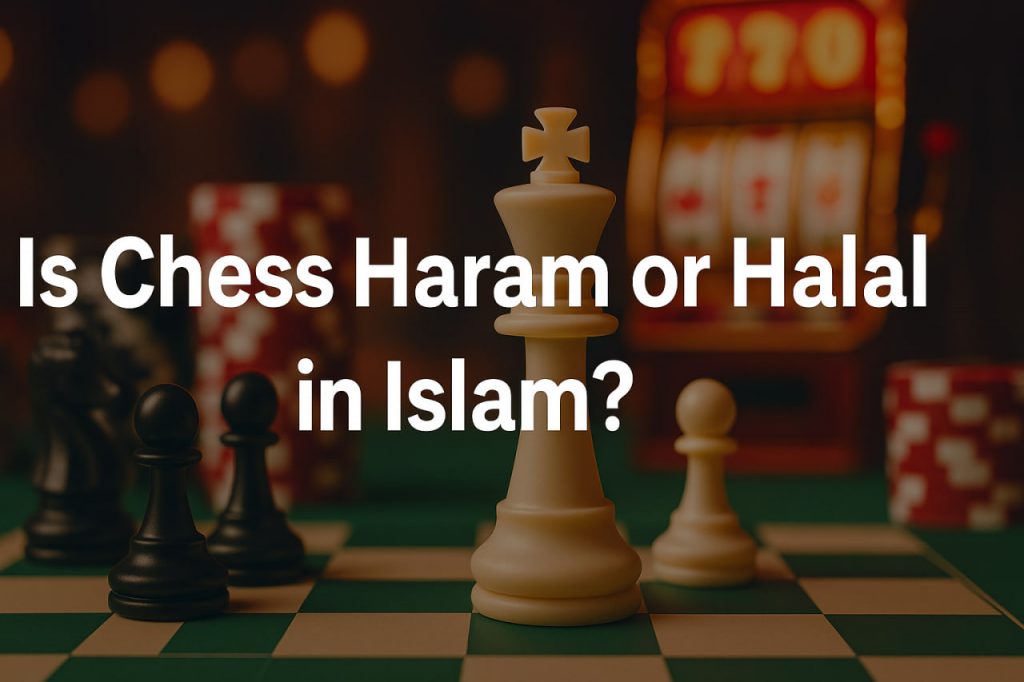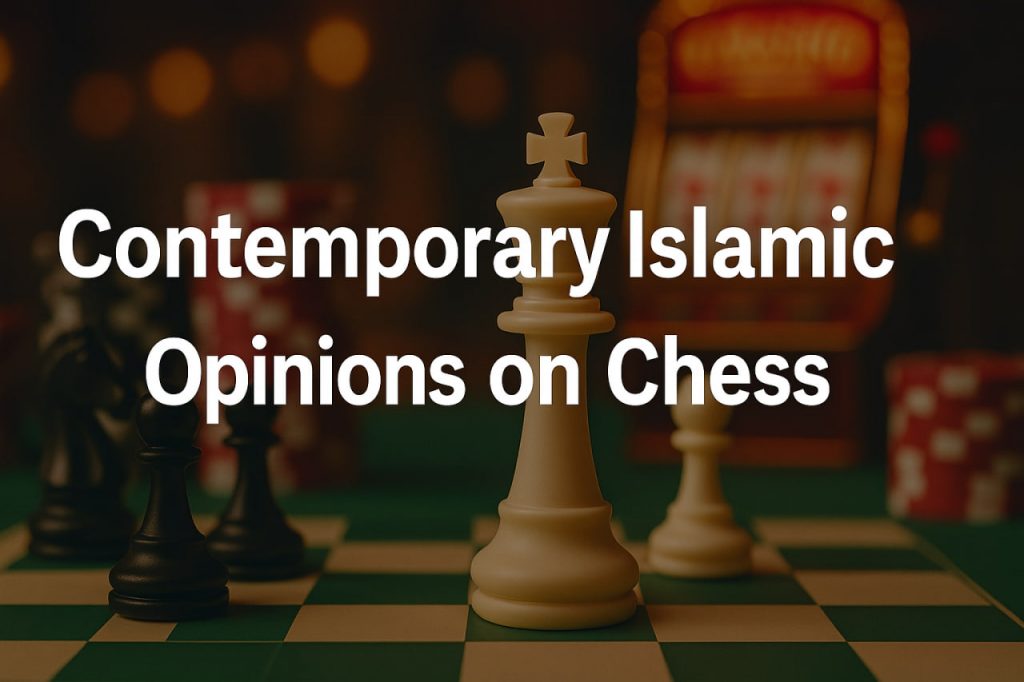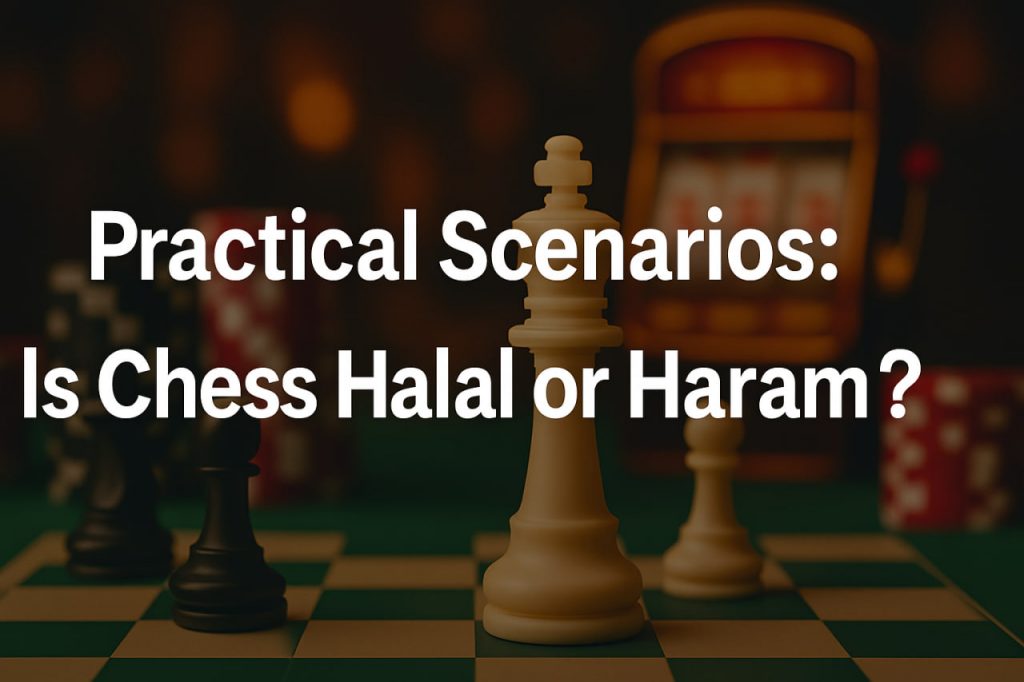Is Chess Haram or Halal in Islam?

Chess is one of the oldest and most intellectually challenging games in human history. With its deep strategy, mental discipline, and cultural prestige, chess has fascinated scholars, warriors, and thinkers for centuries. But a pressing question often arises in the minds of many Muslims: Is chess haram or halal in Islam? Is playing chess haram, or can it be a lawful and spiritually enriching activity in the light of Islamic teachings?
In this extended and comprehensive article, we will explore this topic from multiple angles. We’ll draw upon the opinions of early and contemporary Islamic scholars, provide detailed analysis from Quranic verses and hadiths, and review real-world examples of how chess is perceived in different Islamic cultures. We’ll also offer practical guidelines, explore common misconceptions, and answer frequently asked questions.
Introduction: Chess in the Islamic Context
Before we can definitively say whether playing chess is haram, we need to understand how Islamic jurisprudence approaches issues of daily life. Islam is a complete way of life that values balance, moderation, and intention. Activities are assessed based on whether they bring benefit or harm, whether they help fulfill religious obligations, or distract from them.
Chess, although not an act of worship or a core pillar of Islam, falls under the category of leisure and intellectual pursuits. Such activities are not inherently forbidden unless they directly or indirectly lead to sin, wastefulness, arrogance, addiction, or neglect of duties.
In Islam, anything that brings about benefit and avoids harm is generally considered mubah (permissible). However, if something becomes a gateway to sin or affects one’s faith or responsibilities, its permissibility is re-evaluated.
Historical Opinions: Classical Islamic Scholarship on Chess
The permissibility of chess has been debated by scholars for over a millennium. The game was introduced to the Muslim world during the early Islamic centuries and quickly gained popularity, sparking extensive legal discussion.
Views from Early Islamic Scholars
| Scholar/School | Opinion on Chess | Reason/Explanation |
|---|---|---|
| Imam Abu Hanifa | Haram | Distracts from religious duties; considered frivolous use of time |
| Imam Malik | Haram | Associated with gambling and time-wasting habits |
| Imam Shafi’i | Makruh (discouraged) | Allowed without gambling or missed prayers |
| Imam Ahmad ibn Hanbal | Permissible with Conditions | Halal unless it leads to sin or addiction |
Most classical scholars agreed that chess could be problematic, not because of the game itself, but because of its effects on behavior and religious observance. It is important to note that these scholars were responding to the cultural norms of their time—when chess was sometimes accompanied by betting, negligence of prayer, or arrogant competition.
Some scholars even permitted chess if it improved mental sharpness or aided in military strategy and leadership training, showing that context and intention were crucial.
Contemporary Islamic Opinions on Chess
In today’s world, scholars and fatwa councils across various countries have issued detailed statements on the issue of chess. Most modern scholars acknowledge that chess is not inherently haram, and whether it is halal depends on the conditions surrounding how and why it is played.

Situations When Chess May Be Haram:
- ✅ If it involves gambling, betting, or prize money gained through prohibited means.
- ✅ If it leads to negligence in prayer, religious duties, or causes one to delay or abandon obligations.
- ✅ If it promotes arrogance, arguments, or enmity among players.
- ✅ If it results in addiction, where a person spends excessive hours to the detriment of their health, family, or deen.
- ✅ If the environment in which it is played is un-Islamic or encourages inappropriate behavior.
Situations When Chess May Be Halal:
- ✅ If it is played for mental development, critical thinking, and strategic training.
- ✅ If it helps relieve stress or enhances social bonding among family or friends.
- ✅ If no gambling, swearing, or time-wasting is involved.
- ✅ If it is done in moderation, with proper time limits, and does not interfere with acts of worship.
- ✅ If it is used as a tool in Islamic education or personal discipline.
Thus, modern Islamic opinion leans towards permissibility under ethical and religiously compliant conditions.
Quranic and Hadith Evidence: Indirect Guidance
Chess is not directly mentioned in the Quran or authentic hadiths. Therefore, scholars rely on qiyas (analogy) and ijtihad (independent reasoning) to determine its ruling. Let’s examine some relevant sources that inform this discussion:
Quranic References:
“And do not waste [your resources]; indeed, the wasteful are brothers of the devils.”
(Quran 17:27)
“O you who have believed, do not consume one another’s wealth unjustly…”
(Quran 2:188)
These verses emphasize the importance of using time and wealth responsibly and avoiding unjust or unproductive activities.
Hadith References:
“There are two blessings which many people lose: health and free time.”
(Sahih al-Bukhari)
“The most beloved actions to Allah are those done consistently, even if small.”
(Sahih Muslim)
“Every servant of Allah will be asked about his life and how he spent it…”
(Sunan At-Tirmidhi)
These narrations encourage Muslims to use time constructively and to avoid activities that bring no spiritual or worldly benefit.
Practical Scenarios: Is Chess Halal or Haram?

Let’s examine real-life scenarios where the ruling on chess may vary:
| Scenario | Ruling | Notes |
| Playing with gambling/betting | Haram | Violates Islamic law on gambling |
| Playing excessively and missing prayers | Haram | Salah is obligatory and must not be delayed |
| Playing online for fun | Halal (Conditional) | Permissible if no sins are involved |
| Using chess to train the mind | Halal | Encouraged if balanced with duties |
| School chess tournaments (no money) | Halal | Educational and structured environment |
| Playing with arrogance or foul language | Haram | Violates Islamic manners |
| Teaching children chess at home | Halal | Enhances cognitive growth |
Final Verdict: Is Chess Haram or Halal in Islam?
So, is chess haram in Islam? The most balanced answer is: It depends.
Chess, in itself, is not haram. It is a game that can be used either constructively or destructively, depending on the player’s intent and the circumstances. If it helps improve the mind, bring people together, or serve as a healthy break, it is not only permissible but potentially beneficial. However, if it causes one to sin, ignore obligations, or fall into un-Islamic behavior, then it becomes prohibited.
Key Takeaways:
- ⚖️ Chess is mubah (permissible) under Islamic law if it is free from gambling, time-wasting, and sinful behavior.
- 🕌 It must never interfere with your salah, family, or spiritual growth.
- 🧠 It can be a tool for learning and self-discipline when approached with good intentions.
- ❓ When in doubt, consult a qualified scholar to consider your specific situation.
Conclusion
In conclusion, the Islamic ruling on chess is not black and white. It resides in a gray area governed by intention, context, and outcome. The more balanced, spiritually mindful, and responsible your approach is, the more likely chess will be seen as halal in your life.
Islam does not oppose enjoyment or mental challenges. It encourages Muslims to live meaningful lives, using time, energy, and intelligence for the betterment of their faith and society. Chess, when played ethically and mindfully, aligns with that principle.
May Allah guide us to use our time wisely and engage in activities that benefit us in both this world and the Hereafter. Ameen.
FAQs
If the session doesn’t include gambling, distraction from prayers, or arrogance, it is generally permissible.
Yes, provided there is no betting involved, and your participation doesn’t interfere with religious obligations.
Not inherently. Make sure to avoid gambling apps, rude behavior, or addiction. Stay in control.
Not necessarily. Chess is intellectual and strategy-based, while many video games may contain violence or immoral content. It depends on the context and content.
Yes, many modern Islamic schools incorporate chess into their curriculum to enhance mental agility.
Then it is makruh or even haram. Balance is key in Islam.
Gambling involves chance and money, whereas chess is skill-based and can be played without financial stakes.
